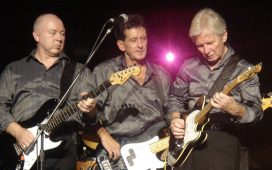Like the rap duo Krept and Konan, Jinx Prowse, who runs the Music Fusion youth project in Hampshire, believes a police clampdown on drill music is not the answer to knife crime. “Gangs and their culture exist first. This then informs the music. Banning drill would be a naive and impotent response to addressing the real issues behind gang culture.”
“We give young people somewhere to belong, respect, a platform to express themselves and a safe place to hang out. Their music can be the first step in moving away from crime.”
The idea of using music to help young people improve their lives is central to the work of Music Fusion, which serves areas of extreme social deprivation in Portsmouth, Havant, Southampton, Gosport and Fareham. Nestled next to Havant’s tiny local museum, its studios rub up uneasily with the area’s seaside tourism.
London’s black communities may have been in the spotlight during the recent surge in knife crime, but predominantly white populations in provincial towns can also be badly affected. A Guardian analysis of official statistics this year showed a 46% average increase in knife-related offences in 34 English and Welsh counties since 2010, compared with an 11% rise in the capital. In 2010-11, there were 451 crimes involving knives or sharp implements in Hampshire. That had risen to 868 by 2017-18, although numbers dipped slightly this year.
Music Fusion aims to channel troubled youngsters’ energy away from crime, violence and anger by offering courses in rapping, singing and music production. But it is rap with a difference.
“They have sometimes [already] been rapping in an American accent about violence and having loads of women and money, but that is not their reality,” says Prowse. “We keep the same beats but I tell them what we are looking for is to emulate conscientious rappers who rap about things that are important to them.”
The project is working against the backdrop of a national debate over how to solve the problem of serious youth violence. A recent report from the home affairs select committee said there was a “serious mismatch” between the government’s diagnosis of the problem and its solutions, citing evidence linking deprivation and vulnerability with knife crime and violence. Labelling the situation a “social emergency”, MPs called for greater investment in early intervention and youth services.
In and around Portsmouth, mounting tensions and violent incidents between feuding young people in different postcodes led to Music Fusion launching its Words Not Weapons scheme.
Matt Stevens, 25, now a music leader at the charity, was one of the youngsters who agreed to take part when it began in 2011. As a teenager he says he was often in trouble with the police, and was thrown out of school and a pupil referral unit (PRU).
“I was feuding with some guy from Gosport, he was sending people to find me and I was sending people to find him. It was a couple of days away from us stabbing one another … It was over nothing, over a postcode.”
The scheme brought them together. “At the time I was a hungry artist and I just wanted to be in the studio … So I agreed to shake hands with my mortal enemy,” says Stevens. “The studio session was set up, in he walked and we stared at each other for a couple of minutes, then we shook hands and we cracked on with the first Words Not Weapons album. We’re still friends.”
The scheme ended in May, but Music Fusion hopes to get funding to run it again. Almost half the charity’s funding is lottery money and the rest comes from public donations and a grant from the Home Office and Hampshire county council. But cuts mean it is no longer open access.
The charity engages around 1,400 young people a year, including teenagers who have been affected by bullying, depression and self-harm, or who are unable to attend mainstream school. It has changed lives: Courtney, 13, who was excluded from two schools and put in a PRU, credits rapping at Music Fusion with getting back into a mainstream school after six months.
Kizz, 18, was bullied, has had depression and has self-harmed. Before he came to Music Fusion, aged 13, he was “ready to commit suicide”, he says. “Because I know I can sit down and write my feelings out, rather than coping the wrong ways … knowing I can influence someone else, that makes me feel like my life is more worth living.” In an independent social impact assessment, more than two-thirds of Music Fusion participants said the charity “believed in me when many others didn’t”. And the vast majority said it had given them advice that had stopped them going to prison.
Kane, 13, a former young offender who is still reeling from his girlfriend’s fatal stabbing a year ago, says of the opportunity to rap and perform: “It raises me up a little bit, makes me feel good about myself.”













